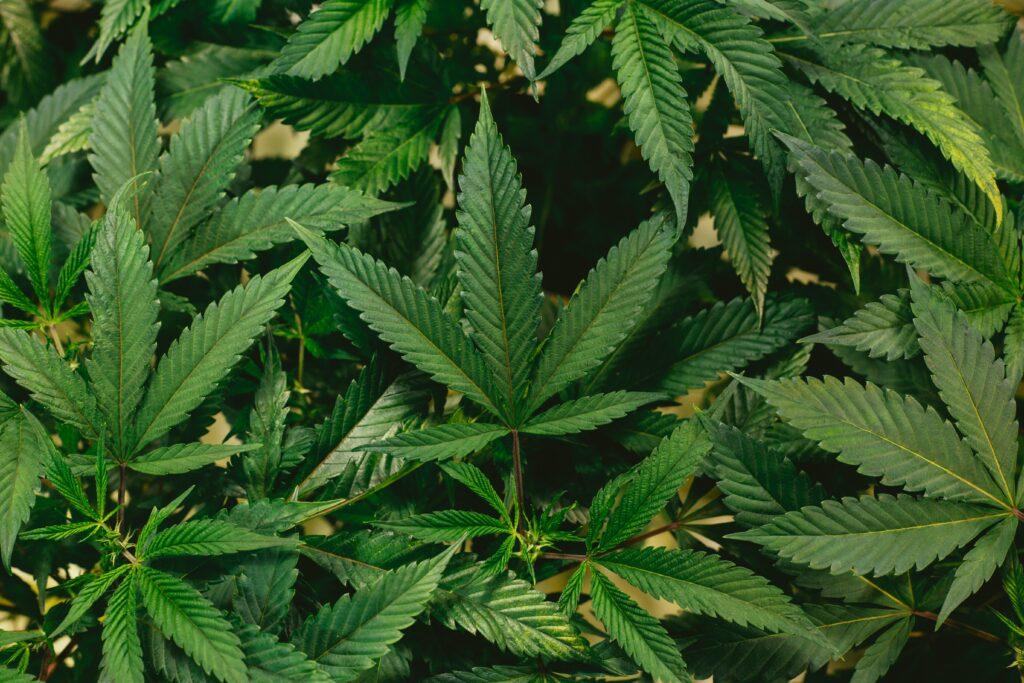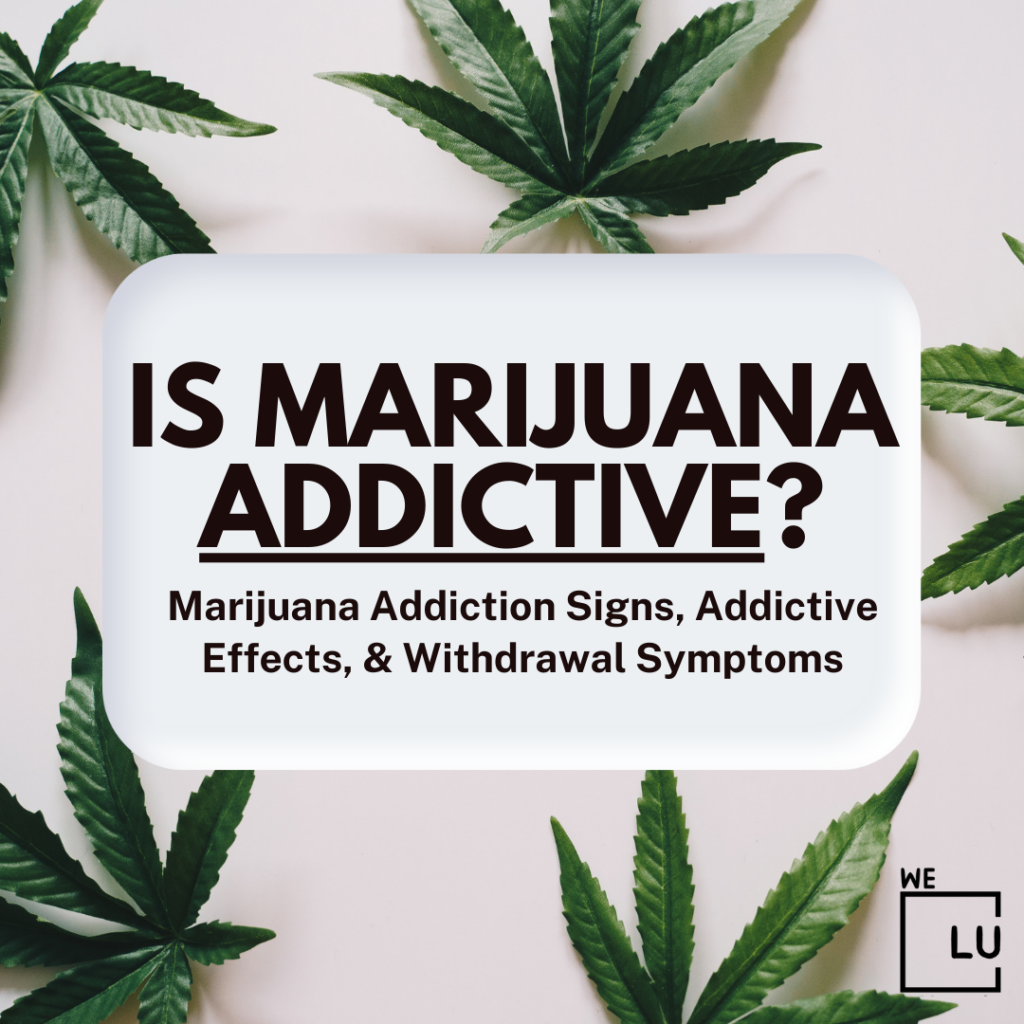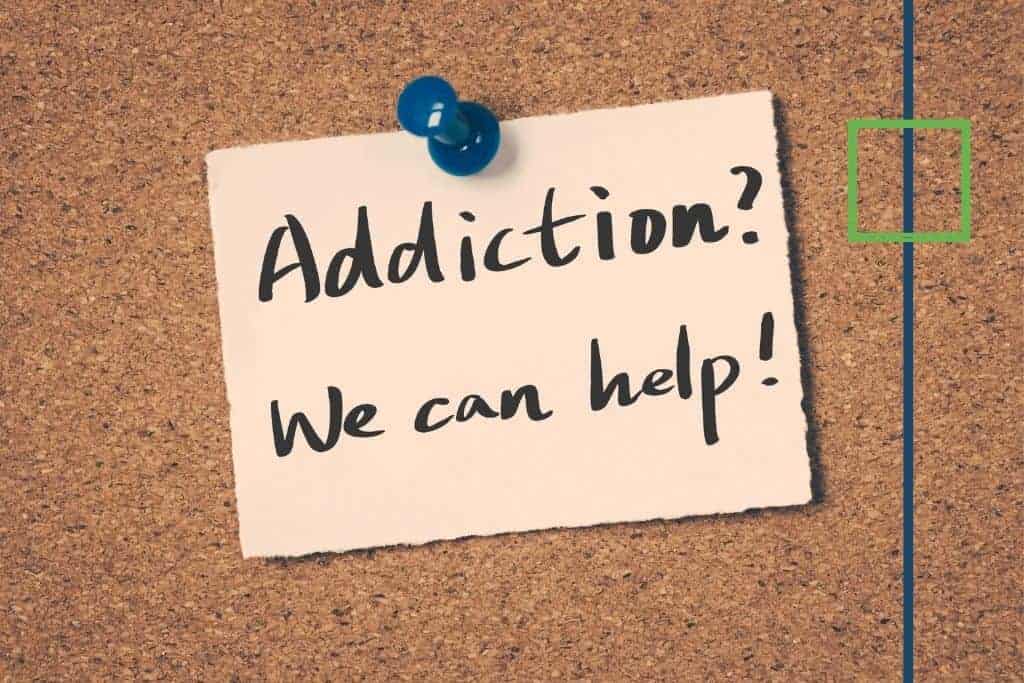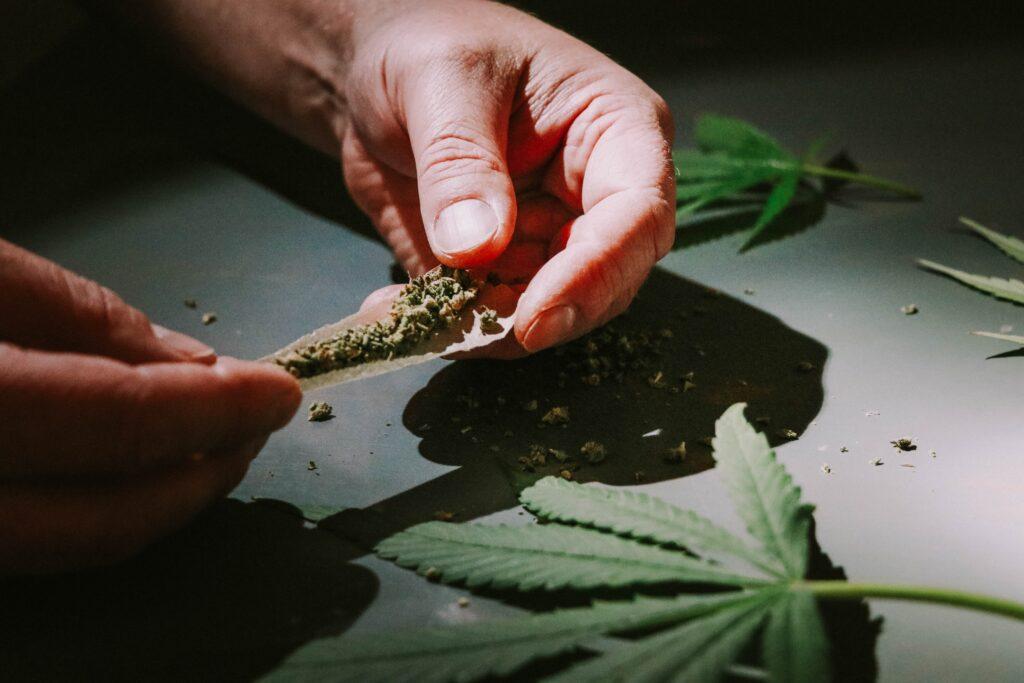Is Marijuana Addictive? Marijuana Addiction Symptoms, Marijuana Addictive Effects, Marijuana Withdrawal Symptoms & Marijuana Addiction Treatment.
Marijuana addiction refers to the persistent and problematic use of cannabis despite its negative impact on psychological, physical, or social well-being. Individuals who engage in cannabis abuse often face difficulties in various aspects of their lives, including cognitive functioning, emotional stability, and interpersonal relationships. Prolonged abuse can lead to dependence and addiction, where the individual becomes unable to control their weed use and experiences withdrawal symptoms when attempting to quit. Continue to read more about marijuana addiction, symptoms, and treatment.
By We Level Up | Editor Yamilla Francese | Clinically Reviewed By Lauren Barry, LMFT, MCAP, QS, Director of Quality Assurance | Editorial Policy | Research Policy | Last Updated: August 2, 2023
What is Marijuana Use Disorder?
Marijuana refers to the dried leaves, flowers, stems, and seeds from the Cannabis sativa or Cannabis indica plant. Marijuana addiction, also known as cannabis use disorder (CUD), is a clinically recognized psychiatric condition characterized by the problematic use of marijuana.
It is included in the Diagnostic and Statistical Manual of Mental Disorders (DSM-5). Individuals with marijuana addiction exhibit patterns of continued marijuana use despite experiencing negative consequences on their physical, psychological, or social well-being. The disorder’s severity is classified as mild, moderate, or severe, depending on the number of diagnostic criteria met. Marijuana addiction treatment typically involves behavioral therapies, counseling, and support groups to help individuals manage marijuana use and improve overall well-being.
But why is marijuana addictive? This article delves into marijuana addiction, examining the associated risks, complications, and accessible treatment choices.
History of Marijuana Use
Marijuana has a long history of human use, dating back thousands of years, with evidence of its cultivation for medicinal, religious, and recreational purposes in various cultures. It was introduced to the Western world in the 19th century and has since undergone shifting legal and social attitudes, leading to global regulatory approaches.
The US Food and Drug Administration categorizes cannabis as a Schedule I drug alongside heroin and peyote. This classification indicates that, at the federal level, cannabis, also known as marijuana, is considered to have no accepted medical use and a high potential for abuse. However, many experts and authorities disagree with this classification. In contrast, drugs like opiates and stimulants fall under Schedule II, acknowledging their medical utility despite the high risk of abuse. Over time, state-directed legislation has led to an increase in cannabis use, creating a shift away from strict federal regulation.
Is Marijuana Legal?
Despite federal regulations in the latter half of the 20th century, marijuana is still among the most commonly used drugs in the United States. The most common users are teenagers and adolescents, and usage tends to decline as these groups age into adulthood due to careers, marriage, cohabitation, and parenthood.
State legalization of marijuana has increased cultivation demand, selective breeding for more potent strains, and competition in the marijuana dispensary industry. Expanding the use and legislation for the legalization of marijuana are propagated by potential health benefits and the absence of health concerns that are not well substantiated.
Medical Use of Marijuanas Pros and Cons
Pros of Medical Use of Marijuana:
- Pain Relief: Marijuana can provide effective pain relief for various conditions, including chronic pain, neuropathic pain, and pain associated with cancer and multiple sclerosis.
- Nausea and Vomiting: It can help alleviate nausea and vomiting caused by chemotherapy and other medical treatments.
- Appetite Stimulation: Marijuana may improve appetite in individuals with eating disorders or undergoing treatments that suppress appetite.
- Muscle Relaxation: It can help relax muscle spasms and improve mobility in conditions like multiple sclerosis and spinal cord injuries.
- Neurological Disorders: Some evidence suggests that marijuana can benefit certain neurological conditions, such as epilepsy and Parkinson’s.
Cons of Medical Use of Marijuana:
- Side Effects: Marijuana use can cause side effects such as dizziness, dry mouth, impaired memory, and cognitive dysfunction.
- Psychological Effects: In some individuals, marijuana can lead to anxiety, paranoia, and hallucinations, particularly with high doses or in susceptible individuals.
- Dependency and Addiction: While the risk of addiction is lower than other substances, long-term and heavy use of marijuana can lead to dependence and addiction in some individuals.
- Impaired Cognitive Function: Marijuana can impair cognitive abilities, attention, and reaction times, which can be problematic in certain situations, such as driving or operating machinery.
- Lack of Regulation: The medical use of marijuana may face challenges due to the lack of standardized dosing and quality control in some regions.
Side Effects of Marijuana
Individual reactions to marijuana can vary, and not everyone will experience all of these side effects. Some side effects may also be more pronounced with higher doses or frequent use.
- Dry Mouth: Also known as “cottonmouth,” marijuana can cause a dry and sticky feeling in the mouth.
- Red Eyes: Marijuana can cause blood vessels in the eyes to dilate, resulting in red or bloodshot eyes.
- Increased Heart Rate: Marijuana use, known as tachycardia, can temporarily increase heart rate.
- Impaired Memory and Concentration: Short-term memory and concentration can be affected while under the influence of marijuana.
- Dizziness: Some individuals may experience dizziness or lightheadedness after using marijuana.
- Anxiety and Paranoia: High doses or individual sensitivity to THC can trigger feelings of anxiety or paranoia.
- Changes in Perception: Marijuana can alter sensory perceptions, leading to changes in time perception or sensory experiences.
- Coordination Issues: Impaired motor skills and coordination can occur, potentially affecting activities like driving.
- Fatigue and Sleepiness: Some users may feel increased fatigue or drowsiness after marijuana use.
- Appetite Changes: Marijuana can increase or decrease appetite, depending on the strain and individual response.
- Psychological Dependence: Long-term and heavy use of marijuana may lead to psychological dependence in some individuals.
- Respiratory Issues: Smoking marijuana can irritate the respiratory system and lead to coughing or respiratory discomfort.
How Addictive is Marijuana?
Approximately 1 in 10 people who use marijuana will become addicted. When they start before age 18, the addiction rate rises to 1 in 6. Some people with marijuana use disorder may need to use more and more marijuana or greater concentrations of marijuana over time to experience a “high.” The greater the amount of tetrahydrocannabinol (THC) in marijuana (in other words, the concentration or strength), the stronger the effects the marijuana may have on the brain. The amount of THC in marijuana has increased over the past few decades.
The Effects of Addiction To Marijuana
It is essential to recognize these effects and seek help promptly if you or someone you care about is struggling with marijuana addiction.
- Physical Health: Prolonged marijuana use can lead to respiratory issues, such as chronic bronchitis and other lung-related problems.
- Mental Health: Frequent use may contribute to cognitive impairment, memory issues, and an increased risk of mental health disorders, such as anxiety and depression.
- Dependency: Continued use can lead to tolerance and dependence, making quitting challenging without experiencing withdrawal symptoms.
- Impaired Judgment: Marijuana use can impair judgment and coordination, leading to accidents and risky behaviors.
- Academic and Work Performance: Addiction can negatively impact concentration, motivation, and productivity, affecting academic and work-related achievements.
- Financial Strain: Regular use may result in financial difficulties due to ongoing expenses on acquiring marijuana.
- Social Isolation: Addiction can lead to withdrawal from social activities and strained relationships with family and friends.
- Legal Consequences: Possession and use of marijuana may lead to legal issues and criminal charges in some jurisdictions.
- Developmental Impact: Teenagers and young adults are particularly vulnerable to the adverse effects of marijuana addiction, which can disrupt brain development.
- Escalation to Other Substances: Marijuana addiction may serve as a gateway to the use of more potent and harmful substances.
Signs of Marijuana Addiction
Is weed addicting? It’s challenging to distinguish marijuana addiction because, unlike other drugs, marijuana does not typically produce intense physical withdrawal symptoms, making it harder to recognize addiction based solely on physical signs.
Marijuana addiction symptoms can develop gradually over time, making it challenging to pinpoint when casual use turns into a more significant problem. Moreover, many people with marijuana addiction may also have co-occurring mental health issues, which can complicate diagnosis and treatment.
The following are signs of marijuana use disorder:
- Using more marijuana than intended.
- Trying but failing to quit using marijuana.
- Spending a lot of time using marijuana.
- Craving marijuana.
- Using marijuana even though it causes problems at home, school, or work.
- Continuing to use marijuana despite social or relationship issues.
- Giving up meaningful activities with friends and family in favor of using marijuana.
- Using marijuana in high-risk situations, such as while driving a car.
- Continuing to use marijuana despite physical or psychological problems.
- Needing to use more marijuana to get the same high.
- Experiencing withdrawal symptoms when stopping marijuana use.
People who have marijuana use disorder may also be at a higher risk of other negative consequences, such as problems with attention, memory, and learning.


Skip To:
Learn More:
- Marijuana Detox, How To Detox From Weed? Is Detoxing From Weed Safe?
- How Long Does Marijuana Stay In Your System?
- Psychosis Weed, Can Marijuana Trigger Psychosis? Weed Psychosis Signs & Symptoms
- Marijuana Withdrawal Symptoms, Weed Withdrawal Symptoms, Timeline, Dangers & Withdrawal Treatment
- Depression and Marijuana. Is Marijuana a Depressant? Does Marijuana Help Depression?
- What is Hash/Hashish Vs Weed? How Hash Weed is Made? Hashish Side Effects Vs Weed. Is Hashish Oil Legal? Hashish Vs Marijuana Differences Exposed.
- K2 Synthetic Marijuana Abuse, Addiction, & Symptoms
- How To Get Weed Out of Your System & How Long For Weed To Get Out of System?
- What’s The Difference Between CBD and THC? Effects of CBD Vs THC
- THC Withdrawal Symptoms, THC Withdrawal Timeline & THC Withdrawal Treatment
Health Risks of Marijuana Addiction
People smoke marijuana in hand-rolled cigarettes, pipes or water pipes, in blunts, and by using vaporizers that pull THC from the marijuana. Marijuana can also be mixed in food (edibles), such as brownies, cookies, and candy, or brewed as tea. People also smoke or eat different marijuana extracts, which deliver a large amount of THC and can be potentially more dangerous.
Marijuana use disorder can have adverse and long-term effects, including the following:
- Brain health: Marijuana can cause permanent IQ loss of as much as 8 points when people start using it at a young age. These IQ points do not come back, even after quitting marijuana.
- Mental health: Studies link marijuana use to depression, anxiety, suicide planning, and psychotic episodes.
- Athletic performance: Research shows marijuana affects timing, movement, and coordination, which can harm athletic performance.
- Driving: People who drive under the influence of marijuana can experience dangerous effects, such as slower reactions, lane weaving, decreased coordination, and difficulty reacting to signals and sounds on the road.
- Daily life: Using marijuana can affect performance and how well people do. Research shows that people who use marijuana are more likely to have relationship problems, worse educational outcomes, lower career achievement, and reduced life satisfaction.
- Baby’s health and development: Marijuana use during pregnancy may cause fetal growth restriction, premature birth, stillbirth, and problems with brain development, resulting in hyperactivity and poor cognitive function. Tetrahydrocannabinol (THC) and other chemicals from marijuana can also be passed from a mother to her baby through breast milk, further impacting a child’s healthy development.
Finding Help For Marijuana Addiction Treatment
Marijuana addiction is never safe and can lead to significant physical, mental, and social consequences. Seeking early intervention and support for those struggling with marijuana addiction is essential to mitigate potential harm and promote overall well-being.
Can weed be addictive? Yes. And for anyone who suffers from marijuana addiction, just the thought of having to stop using can cause severe mental distress. But, the process is managed with the help of a medical detox center.
Moreover, a comprehensive team prescribing medications can alleviate withdrawal pains while monitoring your health 24 hours. Thus, assuring both your safety and comfort.
It would be best if you detox to obtain recovery in a safe and medically supervised setting. We Level Up treatment center medically assists clients in clearing their systems of addictive substances. After the detox, We Level Up’s residential care will slowly and effectively introduce the individual into an atmosphere of therapeutic growth. Marked by Master’s level therapists, clinicians, group counselors, psychiatrists, and a community of like-minded individuals with the same aim: to attain sobriety and live a great life.

World-class, Accredited, 5-Star Reviewed, Effective Addiction & Mental Health Programs. Complete Behavioral Health Inpatient Rehab, Detox plus Co-occuring Disorders Therapy.
CALL(844) 597-1011End the Addiction Pain. End the Emotional Rollercoaster. Get Your Life Back. Start Drug, Alcohol & Dual Diagnosis Mental Health Treatment Now. Get Free No-obligation Guidance by Substance Abuse Specialists Who Understand Addiction & Mental Health Recovery & Know How to Help.
Can You Get Addicted To Weed?
Yes, weed is addictive. The active compound in marijuana, THC (delta-9-tetrahydrocannabinol), interacts with the brain’s endocannabinoid system. This system regulates mood, reward, and motivation. Prolonged use of marijuana can lead to changes in the brain’s reward circuitry, resulting in tolerance, where higher doses are needed to achieve the same effects, and dependence, where the user experiences weed withdrawal signs and symptoms when they try to quit.
The likelihood of addiction to weed can vary based on individual factors, such as the age of first use, genetics, frequency of use, and the potency of the marijuana consumed. Moreover, individuals with a history of psychiatric disorders or substance use problems may be more susceptible to marijuana addiction. Can marijuana be addictive? While marijuana is not as physically addictive as some other drugs, its potential to cause psychological dependence and the associated negative consequences highlight the importance of understanding its addictive nature and promoting responsible use.
Is Marijuana Physically Addictive?
Can you be addicted to marijuana? Marijuana is generally considered to have a lower physical addictive potential compared to substances like opioids or alcohol. The physical withdrawal symptoms associated with marijuana cessation are relatively mild and may include irritability, insomnia, decreased appetite, and mild discomfort. However, some individuals can still develop physical dependence with regular and heavy use, indicating a potential for physical addiction in some cases.
Cannabis Use Disorder Facts
Marijuana Drug Class: Psychoactive drug.
Marijuana Schedule: Marijuana is a Schedule I substance under the Controlled Substances Act.
Is Marijuana Addictive Physically or Psychologically?
Marijuana addiction can involve physical and psychological aspects, but it is primarily considered psychologically addictive. The main psychoactive compound in marijuana, THC, affects the brain’s reward system, increasing dopamine release and reinforcing the desire to continue using the drug. This psychological dependence can result in cravings and difficulty quitting, even without severe physical withdrawal symptoms.
While marijuana is not known to cause severe physical withdrawal symptoms, some users may experience mild physical discomfort upon cessation, such as headaches, irritability, and sleep disturbances. However, these symptoms are generally less intense and shorter-lasting than those associated with physically addictive substances like opioids or alcohol.
Marijuana addiction is predominantly psychological, driven by the rewarding effects of THC on the brain’s reward pathways. Still, it may also involve a degree of physical dependence for some individuals.
Vaping Marijuana and Nicotine
Marijuana concentrates are increasingly being used in vaping devices. Many users prefer vaping because it is smokeless, sometimes odorless, and easy to hide or conceal. The user takes a small amount of marijuana concentrate, referred to as a “dab,” then heats the substance using the vaping device to produce vapors that ensure an instant “high” effect for the user (“dabbing”).
Marijuana concentrates can also be infused in various food or drink products, creating marijuana edibles.
Marijuana Use Disorder Symptoms
Am I addicted to weed? Recognizing if you have a marijuana addiction or marijuana use disorder involves being honest with yourself and observing your behaviors and thought patterns. Here are some signs that may indicate a marijuana addiction:
- Intense cravings or urges to use marijuana regularly.
- Difficulty controlling or cutting back on marijuana use, despite attempts to do so.
- Spending a lot of time obtaining, using, or recovering from the effects of marijuana.
- Neglecting responsibilities at work, school, or home due to marijuana use.
- Using marijuana in situations where it is physically hazardous, such as driving or operating machinery.
- Prioritizing marijuana use over social activities or hobbies.
- Continued marijuana use despite negative consequences on physical or mental health, relationships, or legal issues.
- Developing tolerance, needing more significant amounts of marijuana to achieve the desired effects.
- Experiencing withdrawal symptoms when trying to stop using marijuana, such as irritability, anxiety, insomnia, loss of appetite, or restlessness.
If you or someone you care about exhibits several of these signs and finds it challenging to control marijuana use, seeking professional help or support from addiction counselors or healthcare professionals may be beneficial. Early intervention and assistance can lead to effective treatment for marijuana addiction and a better chance of overcoming marijuana addiction.

Get Your Life Back
Find Hope & Recovery. Get Safe Comfortable Detox, Addiction Rehab & Dual Diagnosis High-Quality Care.
Hotline(844) 597-1011Marijuana Addiction Statistics
The use of marijuana for recreational purposes was becoming more widespread in states where it was legal, leading to changes in social and cultural attitudes. Despite the legalization in many forms, there were still arrests and criminal charges related to marijuana possession and use in states where it remained illegal.
18-25
Young adults aged 18 to 25 had the highest rate of marijuana use and marijuana use disorder compared to other age groups.
Source: CDC
137,000
In 2019, around 137,000 individuals sought treatment for marijuana use disorder in publicly funded treatment facilities in the United States.
Source: SAMHSA
10
Roughly 1 in 10 people who use marijuana will become addicted.
Source: NCBI

Importance of Marijuana Use Disorder Treatment
As cannabis strains become more potent and accessible, the risk will increase for the frequency and severity of severe adverse reactions. For individuals with marked intoxication or withdrawal or cannabis use disorder, the goal should be to stop the drug altogether. Unlike abrupt cessation, a gradual decrease is likely to decrease the discomfort of the withdrawal and relapse prevention. Supportive management, such as a calm, non-stimulating environment, helps patients.
The purpose of marijuana addiction treatment should be to improve the individual’s overall function, which is multiphasic and multifactorial. Supportive therapy may be provided during detoxification; enabling access to psychiatric services allows for addressing underlying disorders.
Psychological counseling can modify behavior, develop healthier coping skills in the face of stressors, and enlighten them regarding their temperament and urge to turn to substances.
Marijuana Addiction Quiz
Am I addicted to marijuana? Laboratory urine, blood, saliva, or hair testing can help detect cannabis use, but results should be considered along with a clinical rationale. A positive test can indicate usage but not necessarily a substance use disorder or intoxication; a negative result does not rule it out. It is possible to quantify tolerance by comparing the reported intake of cannabis to blood levels. Heavy or chronic cannabis smokers will take longer to clear THC than sporadic or one-time users. Other tests to rule out additional conditions may be of benefit. These include head imaging or laboratory testing of heavy metals, infection, immunological markers, electrolyte disturbances, or hormones.
Cannabinoid hyperemesis syndrome (CHS) is a rare condition characterized by cyclic episodes of severe nausea, vomiting, and abdominal pain in heavy and long-term marijuana users. Take the quiz down below to find out if you have CHS.
Cannabinoid Hyperemesis Syndrome Quiz
Can you become addicted to marijuana? Marijuana use disorder often co-occurs with other mental health conditions, such as anxiety, depression, and other substance use disorders. Find out below if you have developed substance abuse.
Substance Use Disorder Quiz
Get Help. Get Better. Get Your Life Back.
Searching for Accredited Drug and Alcohol Rehab Centers Near You?
Even if you have failed previously and relapsed, or are in the middle of a difficult crisis, we stand ready to support you. Our trusted behavioral health specialists will not give up on you. When you feel ready or just want someone to speak to about therapy alternatives to change your life call us. Even if we cannot assist you, we will lead you to wherever you can get support. There is no obligation. Call our hotline today.
(844) 597-1011Marijuana Withdrawal Symptoms
How is marijuana addictive? One of the most significant signs of addiction is withdrawal. Marijuana withdrawal symptoms can vary from person to person, but common symptoms may include the following:
- Irritability and mood swings.
- Anxiety or depression.
- Insomnia or sleep disturbances.
- Loss of appetite or weight loss.
- Restlessness or agitation.
- Headaches.
- Sweating and chills.
- Nausea or stomach discomfort.
- Cravings for marijuana.
- Difficulty concentrating or cognitive fog.

Not everyone who stops using marijuana will experience withdrawal symptoms, and the severity and duration of these symptoms can also differ based on factors such as the frequency and duration of marijuana use. If you or someone you care about is struggling with marijuana withdrawal symptoms or addiction, seeking professional help or support can be beneficial.
How To Find Marijuana Addiction Treatment Near Me?
To find marijuana addiction treatment near you, you can follow these steps:
- Research Online: Start by searching online for addiction treatment centers or facilities in your local area. Use search terms like “weed addiction treatment,” “marijuana addiction help,” or “substance abuse treatment near me.”
- Use Treatment Directories: Utilize online directories that specialize in providing information about addiction treatment centers and services. Websites like SAMHSA’s Treatment Locator (https://findtreatment.samhsa.gov/) or the Substance Abuse and Mental Health Services Administration (SAMHSA) can help you locate treatment options in your area.
- Reach Out to Helplines: Many organizations and hotlines provide confidential assistance and information about addiction treatment services. SAMHSA’s National Helpline at 1-800-662-HELP (1-800-662-4357) is a free, confidential helpline available 24/7 to help you find treatment options near you.
- Consult with Healthcare Providers: Speak with your primary care physician or a mental health professional. They can recommend local treatment centers or specialists who can help with marijuana addiction.
- Check with Insurance Providers: If you have health insurance, check with your provider to see which addiction treatment services are covered under your plan. They may have a list of in-network treatment centers you can consider.
- Local Support Groups: Look for local support groups or organizations focusing on addiction recovery. These groups may have information about nearby treatment centers or resources.
- Ask for Referrals: Contact friends, family, or colleagues with experience or knowledge about addiction treatment centers in your area.
Reach out for assistance, and don’t hesitate to seek professional help to start your journey toward recovery.
We Level Up Rehab for Marijuana Addiction
If you suspect marijuana that someone you care about is grappling with addiction, it is crucial to take action and seek help for them. Although accepting that a loved one is struggling with addiction can be challenging, it can save their life. Understandably, you may feel tempted to deny or overlook the warning signs of weed addiction and may not know how to provide the necessary assistance. In such cases, conducting an intervention can be a powerful approach to motivate your loved one to embark on recovery.
Contact We Level Up NJ to get started. We can help you explore different treatment options and provide resources based on your unique case.
First-class Facilities & Amenities
World-class High-Quality Addiction & Mental Health Rehabilitation Treatment
Rehab Centers TourRenowned Addiction Centers. Serene Private Facilities. Inpatient rehab programs vary.
Addiction Helpline(844) 597-1011Proven recovery success experience, backed by a Team w/ History of:
15+
Years of Unified Experience
100s
5-Star Reviews Across Our Centers
10K
Recovery Success Stories Across Our Network
- Low Patient to Therapist Ratio
- Onsite Medical Detox Center
- Comprehensive Dual-Diagnosis Treatment
- Complimentary Family & Alumni Programs
- Coaching, Recovery & Personal Development Events
Top 7 Can You Be Addicted To Weed? FAQs
-
Can you get addicted to marijuana?
Yes, it is possible to develop an addiction to marijuana. Regular and prolonged use can lead to tolerance, dependence, and withdrawal symptoms when attempting to quit, indicating the addictive nature of the drug.
-
Is weed a drug addiction?
Yes, weed, which refers to marijuana or cannabis, can lead to drug addiction in some individuals. Prolonged and excessive use of marijuana can result in physical and psychological dependence, leading to addiction with potential negative consequences on one’s life and well-being.
-
How addictive is weed?
The addictive potential of weed (marijuana) has been a subject of scientific research, and it is generally considered less addictive than other substances like opioids or nicotine. However, studies suggest that around 9% of regular marijuana users may develop dependence, increasing to about 17% for those who use marijuana at a young age.
-
Is medical marijuana addictive?
Medical marijuana, like any other form of marijuana, has the potential to be addictive. While it may be prescribed for various medical conditions, prolonged use and high doses can lead to tolerance, dependence, and addiction, especially in vulnerable individuals.
-
Is marijuana chemically addictive?
Marijuana is not considered chemically addictive in the same way as substances like opioids or alcohol. It does not cause severe physical withdrawal symptoms upon cessation. Still, it can lead to psychological dependence and addiction in some individuals due to its effects on the brain’s reward system and neurotransmitters.
-
Is marijuana physically or psychologically addictive?
Marijuana is primarily psychologically addictive, meaning it can lead to dependence based on its mood, emotions, and behavior effects. While it may not cause severe physical withdrawal symptoms, some individuals may experience mild physical discomfort when trying to quit.
-
What makes marijuana addictive?
The addictive nature of marijuana is primarily attributed to its effects on the brain’s reward system. How is weed addictive? The psychoactive compound THC (delta-9-tetrahydrocannabinol) binds to specific receptors in the brain, leading to increased dopamine release, reinforcing the behavior of using marijuana, and potentially leading to dependence and addiction over time.
Marijuana Withdrawal Symptoms Timeline, Half-life, Effects, and Addiction Dangers.
Is marijuana addicting? Yes. Marijuana addiction, also known as cannabis use disorder (CUD), is characterized by compulsive use despite negative consequences. It can lead to dependence, and when individuals try to stop using marijuana, they may experience withdrawal symptoms such as irritability, insomnia, loss of appetite, and anxiety.
While not everyone who uses marijuana develops an addiction or experiences withdrawal, those who do may benefit from seeking professional help and support. Treatment options may include behavioral therapies, counseling, and support groups.
If you or a loved one is struggling with marijuana addiction or other substance use disorder(s), call for a FREE consultation 24/7 at (561) 678-0917
Get FREE addiction treatment insurance check – https://welevelup.com/rehab-insurance/
Experience Transformative Recovery at We Level Up Treatment Centers.
See our authentic success stories. Get inspired. Get the help you deserve.
Start a New Life
Begin with a free call to an addiction & behavioral health treatment advisor. Learn more about our dual-diagnosis programs. The We Level Up Treatment Center Network delivers recovery programs that vary by each treatment facility. Call to learn more.
- Personalized Care
- Caring Accountable Staff
- World-class Amenities
- Licensed & Accredited
- Renowned w/ 100s 5-Star Reviews
We’ll Call You
Search We Level Up Marijuana Addiction Detox, Mental Health Topics & Resources
Sources
[1] Turner AR, Agrawal S. Marijuana. [Updated 2022 Aug 22]. In: StatPearls [Internet]. Treasure Island (FL): StatPearls Publishing; 2023 Jan-. Available from: https://www.ncbi.nlm.nih.gov/books/NBK430801/
[2] National Academies of Sciences, Engineering, and Medicine; Health and Medicine Division; Board on Population Health and Public Health Practice; Committee on the Health Effects of Marijuana: An Evidence Review and Research Agenda. The Health Effects of Cannabis and Cannabinoids: The Current State of Evidence and Recommendations for Research. Washington (DC): National Academies Press (US); 2017 Jan 12. 4, Therapeutic Effects of Cannabis and Cannabinoids. Available from: https://www.ncbi.nlm.nih.gov/books/NBK425767/
[3] Patel J, Marwaha R. Cannabis Use Disorder. [Updated 2022 Jul 11]. In: StatPearls [Internet]. Treasure Island (FL): StatPearls Publishing; 2023 Jan-. Available from: https://www.ncbi.nlm.nih.gov/books/NBK538131/
[4] Connor JP, Stjepanović D, Le Foll B, Hoch E, Budney AJ, Hall WD. Cannabis use and cannabis use disorder. Nat Rev Dis Primers. 2021 Feb 25;7(1):16. Doi 10.1038/s41572-021-00247-4. PMID: 33627670; PMCID: PMC8655458.
[5] Addiction (Marijuana or Cannabis Use Disorder) – Centers for Disease Control and Prevention (CDC)
[6] Cannabis (Marijuana) DrugFacts – National Institute on Drug Abuse (NIDA)
[7] Know the Negative Effects and Risks of Marijuana Use – Substance Abuse and Mental Health Services Administration (SAMHSA)
[8] Drug Fact Sheet: Marijuana/Cannabis Drug Enforcement Administration (DEA)
[9] VA and Marijuana – What Veterans Need to Know Veterans Affairs (.gov)
[10] Office of Cannabis Management – Office of Cannabis Management (.gov)


